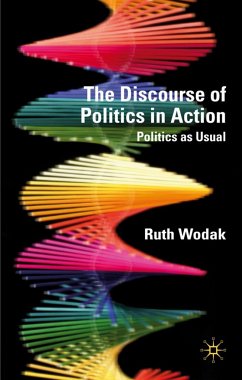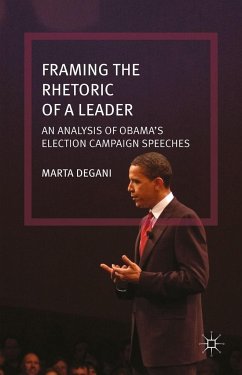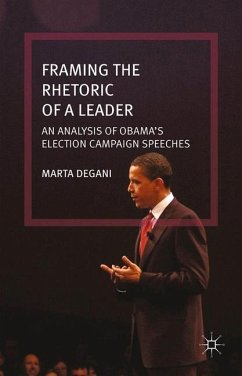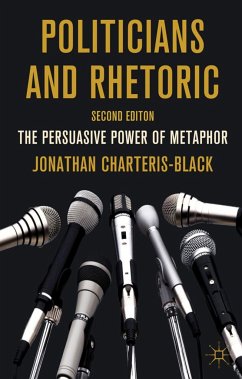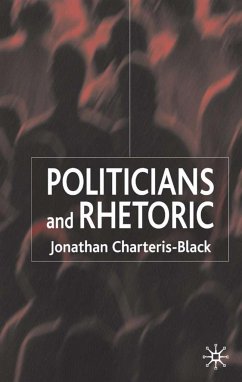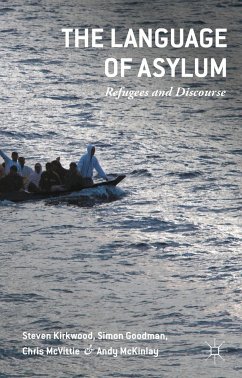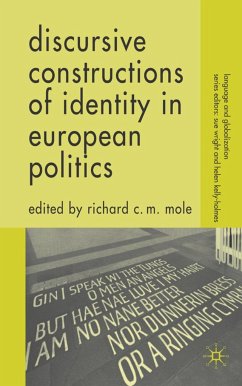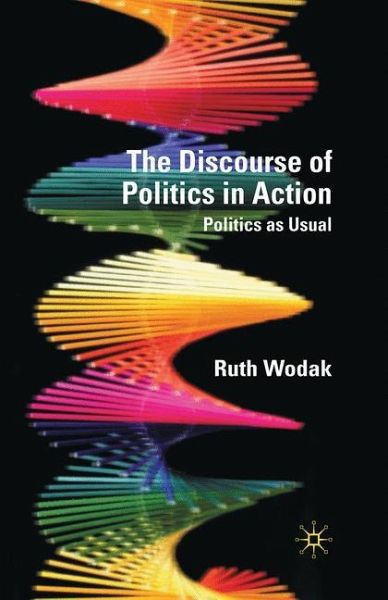
Versandkostenfrei!
Versandfertig in 6-10 Tagen
Weitere Ausgaben:

PAYBACK Punkte
38 °P sammeln!





An interdisciplinary study providing first-hand evidence of the everyday lives of politicians; what politicians actually do on 'the backstage' in political organizations. The book offers answers to the widely discussed phenomena of disenchantment with politics and depoliticization.
RUTH WODAK, is Distinguished Professor of Discourse Studies at the Department of Linguistics, Lancaster University, UK. (and affiliated to the University of Vienna). Besides various other prizes, she was awarded the Wittgenstein Prize for Elite Researchers in 1996. She has published widely on (European and national) Identity Politics, Racism and Discrimination, Multilingualism and Language Policies, and Politics of the Past.
Produktdetails
- Verlag: Palgrave Macmillan / Palgrave Macmillan UK / Springer Palgrave Macmillan
- Artikelnr. des Verlages: 978-0-230-30075-0
- 2009
- Seitenzahl: 272
- Erscheinungstermin: 28. April 2009
- Englisch
- Abmessung: 216mm x 140mm x 15mm
- Gewicht: 365g
- ISBN-13: 9780230300750
- ISBN-10: 0230300758
- Artikelnr.: 33252540
Herstellerkennzeichnung
Springer-Verlag GmbH
Tiergartenstr. 17
69121 Heidelberg
ProductSafety@springernature.com
'In this fascinating ethnographic study, and within an integrated interdisciplinary theoretical framework, Ruth Wodak goes beyond the usual analysis of political discourse. She examines the hectic daily 'backstage' of doing politics ("walk and talk") by european parliamentarians as well as in the fictional world of the TV series The West Wing. A great contribution to both discourse studies and political science.' - Teun van Dijk, Pompeu Fabra University, Barcelona, Spain
'What if politics was a play? With her trademark impressive methodological rigour and immense creativity, Ruth Wodak takes us on a fascinating journey where she decodes the logic of political discourse, action, and representation. The result is a brilliant, rich,
'What if politics was a play? With her trademark impressive methodological rigour and immense creativity, Ruth Wodak takes us on a fascinating journey where she decodes the logic of political discourse, action, and representation. The result is a brilliant, rich,
Mehr anzeigen
and subtle book. From the backstage of the European Parliament to popular political sitcoms, she reveals a face of democratic practice that we cannot afford to ignore.' - Michael Bruter, London School of Economics and Political Science, UK
'...yet another thought provoking and elegant book by Ruth Wodak...a valuable contribution to the analysis of everyday political routines...' - Anna Horoletz, Qualitative Sociology Review
'Wodak's book will provide researchers, students, and political enthusiasts with a very rich study of frontstage and backstage politics.' - Ruth Harman, University of Georgia, USA
'Ruth Wodak is one of the leading and most productive scholars in the field of Critical Discourse Analysis (CDA). This present book addresses the discourse of politics, more specifically the questions 'how politics is done' and 'what politicians actually do'...These questions are addressed on the basis of rich empirical data gathered in previous years as part of wider projects investigating discursive practices within the European Union institutions, research projects conducted by Ruth Wodak and her co-workers either at Lancaster University or at Vienna where she worked before moving to the UK. There are extensive acknowledgements and references to previous projects and related publications. Her main aim of this book is presented as integrating ''these seemingly fragmented findings from many ethnographic case studies into a theoretical, interdisciplinary framework which could throw light on the discursive construction and representation of politics in action''...' - Journal of Pragmatics
'Wodak's book is well-worth reading and thinking about.' - Jonathon Roberge, The Centre for Cultural Sociology
'...with its abundance of suggestive, empirical and methodological insights, this excellent study illuminates a political world that is typically invisible in mainstream European media. While it may not achieve visibility among a wider public of often suspicious or indifferent EU citizens, Wodak's book comes highly recommended to researchers and higher level students examining the relationship between media and politics.' - International Journal of Media and Cultural Politics
'The book will be of great interest to critical scholars of policy-making both for the insight it gives into the backstage world of the EU Parliament and as a demonstration of one of the major methodological approaches available to critical policy analysts - CDA. Wodak makes a valuable contribution to our understanding of 'how politics is done' and, by extension, the work of politicians in how policy is created and reproduced.' - Critical Policy Studies
'...the book, adopting theoretical and empirical approaches to text analysis, proves to be a comprehensive manual that is both persuasive and influential. The book vividly demonstrates how the daily power struggle for hegemony goes on in the European Parliament...an important work for any student or professor of linguistics, theoretical and applied, or political science today.' - Critical Discourse Studies
'In her exemplary book, Ruth Wodak provides a compendium of fifteen years of studies of European Union (EU) politicians working behind the scenes...the conceptual framework, methodological description, and analysis of text are so weel executed that this book seems certain to spur further studies of its type.' Language in Society
'...yet another thought provoking and elegant book by Ruth Wodak...a valuable contribution to the analysis of everyday political routines...' - Anna Horoletz, Qualitative Sociology Review
'Wodak's book will provide researchers, students, and political enthusiasts with a very rich study of frontstage and backstage politics.' - Ruth Harman, University of Georgia, USA
'Ruth Wodak is one of the leading and most productive scholars in the field of Critical Discourse Analysis (CDA). This present book addresses the discourse of politics, more specifically the questions 'how politics is done' and 'what politicians actually do'...These questions are addressed on the basis of rich empirical data gathered in previous years as part of wider projects investigating discursive practices within the European Union institutions, research projects conducted by Ruth Wodak and her co-workers either at Lancaster University or at Vienna where she worked before moving to the UK. There are extensive acknowledgements and references to previous projects and related publications. Her main aim of this book is presented as integrating ''these seemingly fragmented findings from many ethnographic case studies into a theoretical, interdisciplinary framework which could throw light on the discursive construction and representation of politics in action''...' - Journal of Pragmatics
'Wodak's book is well-worth reading and thinking about.' - Jonathon Roberge, The Centre for Cultural Sociology
'...with its abundance of suggestive, empirical and methodological insights, this excellent study illuminates a political world that is typically invisible in mainstream European media. While it may not achieve visibility among a wider public of often suspicious or indifferent EU citizens, Wodak's book comes highly recommended to researchers and higher level students examining the relationship between media and politics.' - International Journal of Media and Cultural Politics
'The book will be of great interest to critical scholars of policy-making both for the insight it gives into the backstage world of the EU Parliament and as a demonstration of one of the major methodological approaches available to critical policy analysts - CDA. Wodak makes a valuable contribution to our understanding of 'how politics is done' and, by extension, the work of politicians in how policy is created and reproduced.' - Critical Policy Studies
'...the book, adopting theoretical and empirical approaches to text analysis, proves to be a comprehensive manual that is both persuasive and influential. The book vividly demonstrates how the daily power struggle for hegemony goes on in the European Parliament...an important work for any student or professor of linguistics, theoretical and applied, or political science today.' - Critical Discourse Studies
'In her exemplary book, Ruth Wodak provides a compendium of fifteen years of studies of European Union (EU) politicians working behind the scenes...the conceptual framework, methodological description, and analysis of text are so weel executed that this book seems certain to spur further studies of its type.' Language in Society
Schließen
Für dieses Produkt wurde noch keine Bewertung abgegeben. Wir würden uns sehr freuen, wenn du die erste Bewertung schreibst!
Eine Bewertung schreiben
Eine Bewertung schreiben
Andere Kunden interessierten sich für


